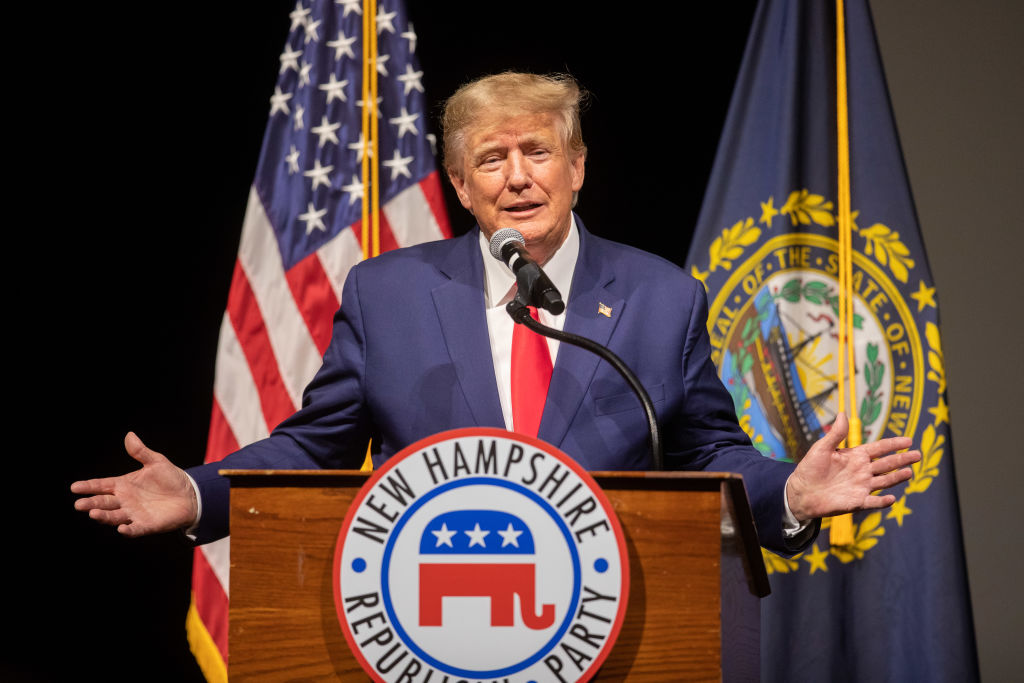
SALEM, N.H.— On Saturday, former President Donald Trump pushed false claims about his own electoral losses and suggested foreign leaders shared his doubts about the outcome of the 2020 vote during his Saturday drop-by in the first-in-the-nation primary state.
Speaking to activists in southern New Hampshire, the ex-President revived his greatest hits as he joined his first campaign event of his 2024 chase of the Republican Party’s White House nomination and tested a new idea—that every day in Joe Biden’s America is a cruel April Fools Day joke.
“I think of the United States. Every day is April Fools Day,” Trump said. “We have open borders when they should be closed. It’s April Fools Day. … We have prisons—people from mental institutions and terrorists—being dumped into our country when they should not be accepted. April Fools Day, right? Who would do that?”
The event’s tone and substance suggested the looming two-year campaign is going to match—if not surpass—the toxic tone of his past attempts.
And it met a rowdy, welcoming audience in New Hampshire, a state Trump wrongly claimed he twice carried in a general election. (Trump lost New Hampshire in 2016 by one-third of a point and again in 2020 by 7 points, but did come out on top in the state’s primaries in those years.)
“As someone who has won the New Hampshire presidential primary not once but twice—and, by the way, I believe we also won two general elections,” Trump said to applause.
Later in his hour-long, stream-of-conscious remarks that seemed vamped, Trump said leaders from other nations were slow to call Biden with congratulations after he won the presidency. “They just didn’t believe it,” Trump said. “They didn’t believe the results.” (That is not the case, even as Trump refused to concede his loss.)
Trump’s sustained truth-stretched swing is hardly a surprise. He has been marinating in exile for the last two years, imagining his revenge comeback and stewing in his grievances. In an update from his 2016 and 2020 speeches, he defended what he called “fringe benefits” that Trump provided to his former money man, Allen Weisselberg. In exchange for his cooperation with federal prosecutors, Weisselberg earned five months in jail after pleading guilty to 15 felony counts. Trump likened himself as a victim of a weaponized Department of Justice, with collateral damage hurled at folks like Weisselberg.
But rhetoric isn’t fact any more than dreams are plans, and Trump’s midterm record is, at best, spotty. His efforts since launching his third real bid for the White House on Nov. 15 have been lacking, as several prominent Republicans have started more openly questioning Trump’s viability. Instead of sprinting to early nominating states like Iowa, New Hampshire, Nevada, and South Carolina to prove them wrong, Trump’s been making headlines for all the wrong reasons: he defended Kanye West amid an antisemitism crisis, dined with a white nationalist, and demanded an unconstitutional redo of the 2020 election.
Trump mocked criticism that he’s been slow to scale-up his campaign. “They’re almost forcing me into the rallies,” Trump said. “We’re going to do them soon. … Bigger than they’ve ever been.”
Read more: Trump’s Return to the Campaign Trail Reveals a Man Unsure of What His Base Wants
And yet Trump won the prized keynote spot for New Hampshire’s state GOP, putting him on stage in front of some of the most plugged-in activists and donors in a state that gave his limping 2016 bid its first win. Trump has long pandered to Granite Staters and their coveted first-in-the-nation primary, and he announced on Saturday that the two-term state GOP chairman was joining the re-election bid as an adviser focused on New Hampshire.
That’s not to say his path is expected to be easy. Consultants and pollsters alike are grumbling about Trump’s perceived vulnerabilities, especially in New Hampshire. A University of New Hampshire survey released this week shows Trump trailing DeSantis by 12 points among likely GOP primary voters in New Hampshire. While the state is famed for its openness to upstart candidates who campaign on a shoestring budget and unreasonable optimism, Trump skipped the small-scale house parties and town halls in favor of massive rallies before and seems on track to do the same this time.
Downplaying the state’s history of rewarding underdogs, Trump steered far afield from his potential challengers. Only one likely rival won an explicit name-check: former National Security Adviser John Bolton, branded by Trump as “one of those stupid people” who were inconsistently Republican.
Even so, two groups staffed tables outside the hall to promote Florida Gov. Ron DeSantis and a life-size cutout of DeSantis stood across the hall for selfies with convention delegates, an unavoidable reminder that New Hampshire likes to be ornery.
With typical bravado, Trump dismissed any threat to his re-nomination in New Hampshire hours before he was set to lead his first stop in South Carolina, another crucial early-nominating state. “I don’t think we have competition this time, to be honest,” Trump said. “We are so far ahead in the polls.” Nationally, that may be the case, but it feels plenty flimsy.
When you’re Trump, saying something repeatedly is as good as fact. And, judging from his first swing on the 2024 trail, that’s going to be central to his strategy once more.
More Must-Reads from TIME
- Donald Trump Is TIME's 2024 Person of the Year
- Why We Chose Trump as Person of the Year
- Is Intermittent Fasting Good or Bad for You?
- The 100 Must-Read Books of 2024
- The 20 Best Christmas TV Episodes
- Column: If Optimism Feels Ridiculous Now, Try Hope
- The Future of Climate Action Is Trade Policy
- Merle Bombardieri Is Helping People Make the Baby Decision
Write to Philip Elliott at philip.elliott@time.com